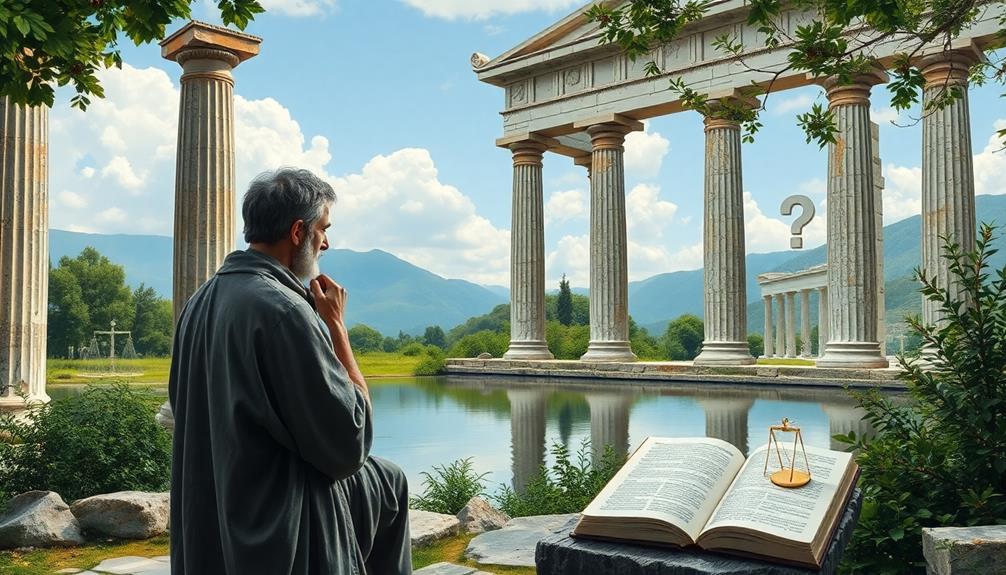Ataraxia is your route to profound tranquility, where you're free from life's chaos. Ancient thinkers like Epicurus taught that true happiness comes from enjoying static pleasures and minimizing desires. These static pleasures foster emotional resilience and stability. You'll find that strong social connections enhance your well-being, driving you toward a deeper sense of calm. Epicurus emphasized moderation, while Stoics focused on mastering your emotions. As you explore this ancient concept, you'll uncover techniques to integrate ataraxia into your life and cultivate lasting peace. The next steps offer more insights into how you can embrace this transformative philosophy.
Key Takeaways
- Ataraxia represents a profound state of tranquility, emphasizing resilience and emotional well-being amidst life's uncertainties.
- Epicurus highlighted the importance of static pleasures over kinetic ones for achieving lasting tranquility and happiness.
- Ancient philosophers like Socrates and Stoics contributed significantly to the understanding of ataraxia through self-reflection and emotional mastery.
- Mindfulness practices and aligning personal values are modern applications that promote ataraxia in today's fast-paced world.
- Embracing ataraxia leads to mental clarity, emotional resilience, and pathways to a more fulfilling life.
Understanding Ataraxia

Ataraxia, often seen as the pinnacle of emotional well-being, embodies a state where you're untroubled by the chaos of life. This ancient Greek term means "unperturbed," and it represents a profound sense of tranquility. Achieving ataraxia isn't just about escaping from discomfort; it's about actively managing your desires and fears.
By focusing on simple pleasures and steering clear of pain, you cultivate a serene existence. Those who experience emotional abuse, such as from emotionally abusive husbands in the Bible, may find it especially challenging to attain this state of peace.
Epicurus emphasized the difference between kinetic and static pleasures. While kinetic pleasures are active and fleeting, static pleasures contribute to lasting tranquility. Embracing static pleasures helps you build resilience against life's inevitable disturbances. Importantly, ataraxia isn't emotional numbness; it's about developing the strength to face uncertainties without being overwhelmed.
Social relationships play an essential role in attaining ataraxia. Forming strong bonds and friendships nourishes your emotional well-being and fosters a peaceful state of mind.
Epicurus and Happiness

Epicurus teaches you to distinguish between kinetic and static pleasures in your pursuit of happiness.
While kinetic pleasures provide temporary joy, static pleasures offer lasting contentment through the absence of pain, or aponia.
Understanding this balance can guide you toward a more fulfilling and tranquil life.
Kinetic vs. Static Pleasures
In exploring the nuances of pleasure, one encounters the distinction between kinetic and static pleasures, both of which play an essential role in understanding happiness. Kinetic pleasures stem from active engagement and experiences, offering immediate satisfaction. However, they often result in a cycle of constant seeking, as the law of diminishing returns can quickly diminish their impact. You might find yourself chasing the next thrill, yet ultimately feeling unfulfilled.
In contrast, static pleasures arise from a state of stillness, promoting tranquility and contentment. These pleasures focus on the absence of pain, both physical and emotional, allowing you to cultivate a deeper sense of well-being. Epicurus emphasized that true happiness is achieved through moderation and an understanding of your desires. By prioritizing static pleasures, you can develop a lasting sense of ataraxia.
Embracing static pleasures over the relentless pursuit of kinetic ones aligns with Epicurus's philosophy. In this way, you can find greater fulfillment and tranquility, fostering a more profound sense of happiness that transcends fleeting moments of excitement.
Ultimately, it's about striking a balance and recognizing what truly nourishes your soul.
Role of Aponia
Finding tranquility through static pleasures naturally leads to the exploration of Aponia, which plays an important role in achieving happiness.
In Epicurean philosophy, Aponia represents the absence of physical pain, a crucial component in your pursuit of Ataraxia. Epicurus emphasized that by minimizing pain and managing your desires, you can attain a more serene and fulfilling life.
To cultivate Aponia, you need to avoid unnecessary desires that can lead to both physical and mental suffering. This approach promotes a tranquil state of being, where you find comfort in simplicity and stability.
Aponia is closely linked to Katastematic pleasure, which focuses on stable, lasting joy derived from freedom from pain rather than the fleeting satisfaction of indulgence.
Epicurus taught that achieving Aponia fulfills your basic human needs, laying the groundwork for overall happiness and Ataraxia.
Critiques of Epicurean Thought

Critiquing Epicurean thought reveals several limitations in its approach to tranquility and fulfillment. One major concern is the potential for passivity. By prioritizing pleasure and the avoidance of mental pain, you might overlook the value of active engagement in life, which is essential for personal growth.
After all, what brings tranquility is subjective and varies from person to person.
Another critique focuses on the emphasis on pleasure as the highest good, which can lead to hedonism and excess, ultimately contradicting the pursuit of true tranquility. This perspective may encourage a shallow understanding of fulfillment, neglecting deeper, more meaningful experiences.
Moreover, some philosophers argue that Epicurus' focus on pleasure and pain avoidance undermines the importance of struggle and adversity. Embracing challenges can foster resilience and contribute to personal growth, aspects that Epicurean thought seems to downplay.
Historical Context of Ataraxia

To understand Ataraxia, you need to contemplate how ancient Greek philosophers shaped its meaning.
The evolution of tranquility concepts reflects a shift from classical ideals to a more personal approach to well-being.
This change highlights the impact of societal pressures on the quest for inner peace during the Hellenistic period.
Ancient Greek Philosophers' Influence
Ataraxia, a state of serene tranquility, underpins much of ancient Greek philosophical thought. Epicurus, a key figure, championed ataraxia as life's ultimate goal, achieved through the pursuit of pleasure and the avoidance of pain. This pursuit isn't merely hedonistic; it's about enjoying simple pleasures while maintaining emotional balance.
Socrates also contributed considerably, emphasizing that tranquility arises from self-reflection and rational thought, which helps you navigate life's challenges. Stoic philosophers like Epictetus and Seneca further expanded on this concept. They taught that mastering your emotions and desires is essential to attaining ataraxia. For them, inner peace means not being swayed by external circumstances.
Notably, ataraxia held practical significance for soldiers in ancient Greece, promoting clarity of thought and effectiveness in high-stress situations. During the Hellenistic period, various philosophical schools intertwined, and ataraxia became a central theme in discussions about personal well-being and ethical living.
Evolution of Tranquility Concepts
Understanding tranquility in ancient thought reveals its evolution through various philosophical lenses. The concept of Ataraxia, meaning "unperturbed" or "without disturbance," began with Epicurus, who emphasized pleasure and pain avoidance. However, earlier thinkers like Socrates laid the groundwork by promoting self-examination for inner peace.
In the Hellenistic period, Stoic philosophers, such as Epictetus and Seneca, redefined tranquility. They framed Ataraxia as a result of virtue and self-mastery, moving away from mere pleasure-seeking. This shift marked an important evolution in how tranquility was understood.
Here's a concise overview of these philosophical perspectives:
| Philosopher | Key Concept | Approach to Tranquility |
|---|---|---|
| Socrates | Self-examination | Rational thought for peace |
| Epicurus | Pleasure vs. Pain | Pursuit of static pleasures |
| Epictetus | Virtue | Self-mastery for tranquility |
| Seneca | Resilience | Endurance through reason |
The blending of Epicurean and Stoic philosophies provided a nuanced understanding of tranquility, shaping how we view Ataraxia today.
Practices for Tranquility

While life often presents challenges, incorporating specific practices can greatly enhance your tranquility. Start by embracing mindfulness techniques, such as meditation and deep breathing. These methods help you become more aware of your thoughts and feelings, promoting both emotional equilibrium and tranquility.
Engaging in daily self-care and mindfulness practices can further support your journey towards peace and wellness, as they allow you to center yourself amid life's chaos top wellness tips.
Engaging in simple activities that align with your personal values can also contribute to a sense of peace and fulfillment. Whether it's gardening, painting, or volunteering, these pursuits ground you in the moment and nurture your well-being.
Cultivating strong friendships and social connections is essential, as the support from loved ones greatly boosts your emotional health. Remember, surrounding yourself with positive influences can create a more tranquil mindset.
Limit your exposure to stress-inducing environments—this step is vital in fostering resilience against external disturbances.
Additionally, adopting a philosophical mindset that embraces acceptance and flexibility allows you to navigate life's uncertainties with grace.
Comparative Philosophical Views

Different philosophical schools offer unique perspectives on achieving ataraxia, each emphasizing distinct paths to tranquility.
Epicureanism views ataraxia as the ultimate goal, closely tied to pleasure (hedone). For Epicureans, finding tranquility involves savoring simple pleasures and avoiding excessive desires. They believe that a contented life stems from fulfilling basic needs and nurturing friendships (philia), which provide emotional support and joy.
In contrast, Stoicism interprets ataraxia as a byproduct of virtuous living and alignment with nature. Stoics focus on self-control and mastering impulses to cultivate emotional resilience. They advocate for living in accordance with reason, emphasizing that true peace comes from within rather than external circumstances.
Aristotle introduces another dimension, suggesting that happiness arises from the cultivation of virtue. This differs from the Epicurean focus on pleasure as the highest good.
Meanwhile, Platonism diverges further by emphasizing abstract ideals over the materialistic approach of Epicureanism. Despite these differences, both Epicureanism and Stoicism acknowledge the importance of community and relationships, highlighting that connections with others are essential for achieving ataraxia.
Modern Relevance of Ataraxia

Ataraxia, a state of serene calmness, has gained significant traction in today's fast-paced world as people increasingly seek effective ways to manage stress and anxiety. This ancient Greek concept encourages you to embrace mindfulness practices like meditation and self-reflection, which are proven to enhance mental health and well-being.
By cultivating ataraxia, you simplify your desires, mirroring modern wellness movements such as minimalism that emphasize emotional stability. Additionally, fostering financial literacy through tools like net worth tracking can contribute to a sense of security, further promoting tranquility in your life.
Incorporating ataraxia into your daily routine can lead to remarkable mental clarity, allowing you to navigate life's challenges with greater resilience. Research shows that individuals who adopt an ataraxian mindset experience improved emotional resilience, helping you better cope with uncertainties and pressures.
Furthermore, the growing interest in ancient philosophical teachings highlights a collective shift towards valuing inner peace. In today's chaotic environment, ataraxia offers a path to tranquility that many find essential for a fulfilling life.
As you pursue this serene state, you'll discover the transformative power of aligning your thoughts and desires, ultimately fostering a deeper connection to your own sense of well-being. Embrace ataraxia and reveal a more tranquil, balanced existence.
Frequently Asked Questions
What Is the Meaning of Ataraxia in Philosophy?
Ataraxia in philosophy means achieving a state of tranquility and emotional balance. It encourages you to manage desires and fears, fostering resilience while remaining engaged in life, ensuring overall well-being and happiness.
What Does Epicurus Mean by Ataraxia?
"Don't sweat the small stuff." For Epicurus, ataraxia means achieving a serene calmness through simple pleasures and balanced desires. It's about avoiding pain and cultivating meaningful friendships to foster lasting emotional tranquility in your life.
Which Ancient Greek Philosopher Built a Philosophy Around the Pursuit of Happiness in Particular Ataraxia and the Minimization of Pain?
You're looking for the ancient Greek philosopher who centered happiness around Ataraxia and pain minimization. That's Epicurus. He taught how understanding desires and fostering friendships leads to lasting tranquility and emotional well-being.
What Is the History of Ataraxia?
Imagine finding peace amidst chaos. Ataraxia's history weaves through ancient Greek philosophy, championed by Epicurus for pleasure's pursuit and Stoics for resilience, shaping a timeless quest for tranquility in life's turbulent waters.
Conclusion
In your journey to discover ataraxia, you'll find that tranquility is more than just a state of mind; it's a way of life. Imagine a busy professional, overwhelmed by stress, who starts practicing mindfulness and prioritizing simple pleasures, like enjoying a quiet cup of tea. Over time, they cultivate a profound sense of peace, illustrating that the pursuit of tranquility can transform your daily existence. Embracing ataraxia isn't just ancient philosophy; it's a practical path to happiness today.









